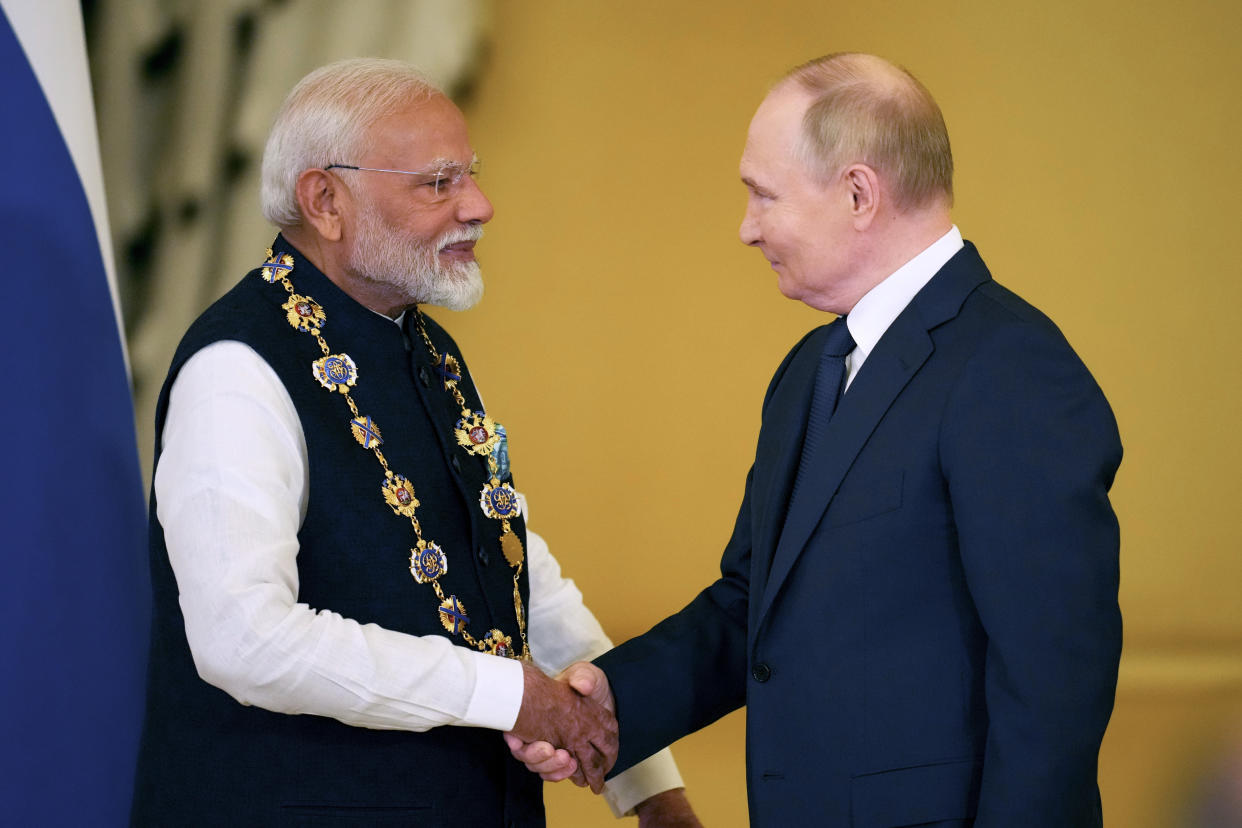Why Modi and Putin Are Friends

Hours before India’s Prime Minister Narendra Modi landed in Moscow on July 8, Russia fired missiles on Ukraine that killed at least 41 people, including four children at a children's hospital in Kyiv. The attack sparked widespread global condemnation, yet Modi was smiling as he posed for photos with Russian President Vladimir Putin.
During Modi’s two-day visit to the Kremlin—his first trip to Russia since its full-scale invasion of Ukraine in 2022— the two leaders hugged each other outside Putin’s suburban residence in Novo-Ogaryovo, before holding informal talks over tea and taking a tour of the grounds. Putin told Modi he was “very happy” to see his “dear friend,” according to Russia’s TASS state news agency, while Modi called the visit a “wonderful opportunity to deepen ties” between the two countries in a post on the social media platform X.
In response, Ukrainian President Volodymyr Zelensky called Modi’s visit “a huge disappointment” on X, saying it was “a devastating blow to peace efforts to see the leader of the world’s largest democracy hug the world’s most bloody criminal in Moscow.”
It became clear, however, that Modi did not plan on challenging Putin over his actions in Ukraine during the visit, and instead used the trip to affirm longstanding strategic and economic ties between the two countries. The Indian leader’s engagement appears to be in part an attempt to stem the Kremlin’s dependence on regional rival China while he continues to walk a tightrope between the East and the West. “As the first state visit of his third term, Modi’s visit to Russia seeks to reassure Putin of the importance of the bilateral relationship at a time when India is deepening relations with the West,” says Chietigj Bajpaee, a senior research fellow for South Asia at Chatham House.
Read More: Indian Prime Minister Modi’s Visit to Washington Is His Most Important So Far. Here’s What to Know
Last June, Modi met with U.S. President Joe Biden during a state visit to Washington, where the two leaders struck a defense, trade, and technology partnership and deepened relations over shared concerns about China’s influence in the region. Still, India has refused to condemn Russia’s invasion of Ukraine and abstained from all resolutions on Ukraine at the United Nations, despite facing pressure to distance itself from Moscow. Instead, Modi has opted for a softer approach to the conflict, telling Putin that “today’s era is not an era of war” during the sidelines of a regional summit in Uzbekistan in 2022. Putin did not attend the G-20 summit hosted by New Delhi last year, where world leaders criticized the Russian invasion of Ukraine.
Experts say Modi’s visit, which occurred at the same time as NATO meetings in Washington, is focused primarily on defense cooperation. It comes after Putin’s return from Kazakhstan last week, where the Russian President claimed during a regional summit that Moscow-Beijing relations were experiencing “the best period in their history.” This relationship has raised concerns for India as tensions with neighboring China have heated up in recent years over a disputed Himalayan border, which has resulted in India becoming increasingly estranged in forums where Russia and China play a prominent role.
As such, Russia’s stance on India-China hostilities in the future will be critical, says Bajpaee, especially given India’s heavy reliance on Russia for military equipment that dates back to the height of the Cold War. “Historically, Moscow has taken a relatively neutral position, but if this were to change, it would prompt New Delhi to rethink its relations with Russia,” he says.
India has also continued to purchase large quantities of Russian crude oil at steep discounts despite Russia facing sanctions and isolation from the West. India is a major financial lifeline for Russia, with trade between the two countries amounting to nearly $65 billion in the last year. Most of that money has flowed toward Russia, however, a trade imbalance that Modi hoped to address during his talks with Putin, according to India’s foreign ministry spokesperson Randhir Jaiswal, who spoke to reporters ahead of the trip.
On Tuesday, the two leaders continued talks over Russian imports vital for Indian power plants. “Energy cooperation is an important issue, arising not only from India’s dependence on Russian crude oil, but also civil nuclear cooperation,” says Bajpaee.
Still, Delhi-Moscow relations were not without contention, as Modi sought to secure the early discharge of dozens of Indian nationals who were lured to join the Russian Army in recent years to fight Ukraine, with at least four dying on the battlefield so far.
But as India seeks to promote a worldview that is “non-western, but not explicitly anti-western,” according to Bajpee, it’s likely the friendship between India and Russia will endure. “For India, Modi’s meeting with Putin in Russia is just a continuation of longstanding strategic ties dating back to the Cold War, but for the U.S. and West, it reminds everyone how difficult it is to enlist New Delhi in a coalition to counter Russia’s invasion of Ukraine,” says Derek Grossman, a senior analyst at the RAND Corporation. “In short, it won’t happen.”
Correction, July 9
The original version of this story misstated the year that Russia invaded Ukraine. It was 2022, not 2019.
Write to Astha Rajvanshi at astha.rajvanshi@time.com.


